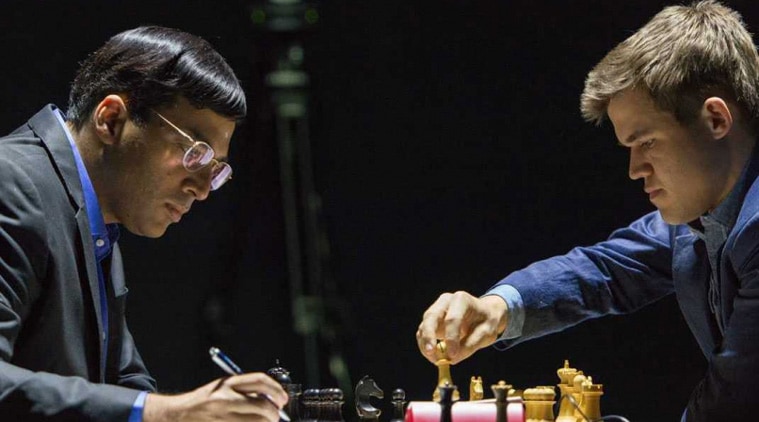
The Indian Express
From Kasparov to Carlsen: Five of the greatest chess matches ever played
Professional chess has seen some classic matches which have been a masterclass in strategy, tactical thinking, and the art of outwitting your opponent.
by Sports DeskIndoor sports requiring minimal equipment have seen a rapid increase in popularity during the lockdown. During times when people are looking for options to explore within their homes, a sport such as chess, requiring simply an 8×8 chessboard, 32 pieces and two enthusiastic players has been a go-to activity for millions of people all around the world.
The centuries old mind sport has developed with time, and has really turned into a professional, viewer-friendly sport in the last five decades. Professional chess has seen some classic matches which have been a masterclass in strategy, tactical thinking, and the art of outwitting your opponent.
Here is a list of five of the greatest chess matches to have ever been played:
Bobby Fischer (W) v Boris Spassky, Reykjavik, 1972
The 1972 World Chess Championship match between American challenger Bobby Fischer and Soviet Union’s defending champion Spassky is often called the ‘match of the 20th century’. With political overtones due to the Cold War, Fischer’s victory in game 21 of the championship ended 24 years of Soviet domination of the sport. The 40-move game and Fischer’s corresponding victory is seen as a historic moment amidst the Cold War tensions, making Fischer an instant celebrity back home, even leading to celebration known as Bobby Fischer Day upon his return. The game and the rivalry have also inspired several musical, documentaries and movies, such as Tobey Maguire’s Pawn Sacrifice (2014).
Anatoly Karpov v Garry Kasparov (W), Moscow, 1985
Karpov entered the World Chess Championship match at a FIDE rating of 2720 with Kasparov not far behind at 2700, with the final match of the championship, match 24, a must-win for Karpov to retain his world title which he had held from 1975 onwards. Often called by Kasparov as the ‘game of his life’, the young Russian turned the game on its head with a far-sighted rook play on his 23rd move. This eventually led to decisive errors from Karpov on move 36 and move 40, leading to his loss after 42 moves. As a result, Kasparov became the thirteenth and youngest world champion aged 22, a title he held till 1993.
Deep Blue (W) v Garry Kasparov, New York, 1997
The 1997 six-game chess match between world chess champion Garry Kasparov and IBM’s supercomputer Deep Blue was a rematch after the machine’s defeat in Philadelphia in 1996. The match was a historic moment in chess, as it was the first time that a computer defeated a reigning world chess champion. The victory was seen as a sign of how far artificial intelligence had come and how it was catching up with the intellectual capabilities of human intelligence. The 19-move game also inspired the 1997 documentary titled ‘The Man v The Machine’ and revealed the additional pressure for a player when playing against an unyielding machine.
Garry Kasparov (W) v Veselin Topalov, Wijk aan Zee (Netherlands), 1999
The year 1999 witnessed one of the most tactical and widely covered and commented chess games ever, between Bulgarian Topalov and Russian grandmaster Kasparov. The two stalwarts of the game indulged in one of the most attacking displays of competitive chess, with Kasparov playing a rook sacrificial combination lasting over 15 moves. The 44-move game, eventually won by Kasparov, has since then come to be known as ‘Kasparov’s Immortal’, and is extensively studied and analysed by chess enthusiasts and players. It is lauded as one of the greatest chess games ever played and further established Kasparov’s legendary ability to see things which most other players missed.
Viswanathan Anand v Magnus Carlsen (W), Chennai, 2013
Five-time world chess champion Viswanathan Anand faced Norwegian challenger Magnus Carlsen for the 2013 title. After 10 games, Carlsen, aged 22, defeated Anand, becoming the second-youngest champion ever, just a few months older than Kasparov was when he won his maiden title. The game was special because it heralded a new era of fast-paced chess, with Carlsen having developed his game in a world with availability of super-strong chess computers. It also ushered in Carlsen’s dominance, who has gone on to win four consecutive world chess championships since then.
These five games are forever etched into the annals of chess history and are a must-watch for budding chess players, as well as people looking to learn more about the sport. The move-by-move analysis and videos of these matches are easily available and act as a great source to improve one’s game or simply appreciate the genius of these players.
Written by Shubhang Gopal